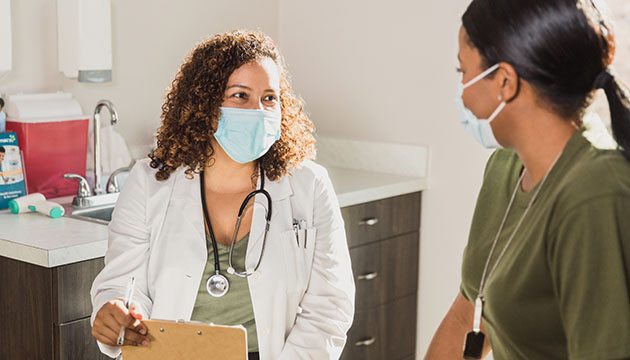Empowering you for a visit with your PCP: What to know
| Wellness | Healthy You | Aging Well

PCPs are your health advocate. Partner with yours for better health and well-being.
One of the most important things you can do for your health is to establish a good relationship with your primary care provider (PCP).
A PCP is someone you trust. Having a good relationship with your PCP can make it easier to talk about your health concerns.
Your PCP's goal is to provide care when you are sick and give you advice on staying healthy in the long run.
If you have a health concern or a chronic condition, a PCP can help coordinate your care. And if you need a specialist, your PCP can give you recommendations, refer you for care and guide you through next steps.
“PCPs are your health advocate,” says Sarah Winslow, MD, a provider with PeaceHealth Medical Group. “We care for the whole person and help our patients foster healthy habits to prevent disease and live their best lives.”
Plan your visit
Prepare in advance for a visit with your PCP to get the most of your time. Here are a few suggestions:
Prepare to answer possible questions from your PCP.
Take now of how you feel physically and mentally. Prepare to answer questions your PCP might ask, such as:
- How long have you had the symptoms?
- What makes the symptoms better? Worse?
- Do the symptoms affect your daily activities? How?
Prepare questions to ask your PCP.
Your visit with your PCP is a two-way exchange or conversation. Think about questions you might ask your PCP, such as:
- Which wellness tests do I need (at my age)?
- How does my family history affect my health?
- Am I at risk of developing heart disease?
Share lifestyle and habits that may affect health.
To give you the best care, your PCP needs to understand you and how you live.
Be open and honest about your habits or daily choices. That might include what you eat, where you live, how you sleep, sexual practices, how much exercise you get, your work and your daily activities.
Share any changes in your appetite, weight, sleep or energy levels. This can help your PCP understand your medical conditions and what you can do about them.
“It may be uncomfortable to talk about some topics, but the more you share, the better we can advise you,” says Dr. Winslow. “Your PCP isn’t here to judge you. We’re here to help, so please be honest. Lying to your PCP may be a disservice to your health.”
If you feel judgment from your PCP and the need to keep information hidden, you may want to find a PCP you feel safe opening up to.
Bring information about your medications.
Bring a list of your medications to your appointment. This should include over-the-counter medicines, herbal remedies and supplements (e.g., eye drops, vitamins and laxatives).
For everything you take, note the dose strength (e.g., 500 milligrams) as well as how much you take and how often (e.g., 1 capsule twice a day). This gives your PCP the right information to help you avoid drug interactions or potential side effects.
Describe your health goals.
Do you want to lose weight, quit smoking or start an exercise routine? Talk about these goals. Your PCP can help you make a plan that will fit your current conditions, especially if you are recovering from an injury or surgery. It might also help you stick to your plan.
If you have one or more chronic condition (e.g., high blood pressure, arthritis, diabetes, asthma), ask your PCP about Flourish. This care management program can help you learn steps that keep you feeling your best.
“Your PCP can also connect you with the right specialist to treat your condition or make referrals to other providers to support your health goals,” adds Dr. Winslow.
Take notes and review the visit summary.
After your visit, you'll get a summary of your visit on paper and/or in your medical record. You might also jot notes to help you remember next steps or specific details.
If you're a PeaceHealth patient, you can view your record safely and securely online at My PeaceHealth. Once you've signed up, you can look at your PCP's notes and send follow up questions through My PeaceHealth.
Bring a family member or trusted friend.
If you’re not feeling well, bring a family member or trusted friend with you to the appointment. They can help you ask or answer questions during the visit. Note: healthcare providers may limit the number of people you bring with you. Ask before your appointment if you have questions.
Having a PCP can help you see the whole picture of your physical and emotional health. It can make a big difference.
“Our priority is your health and wellness,” reminds Dr. Winslow. “Partnering with your PCP will pay dividends in the long run.”






